Related Research Articles
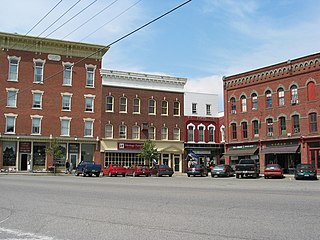
Fair Haven is a town in Rutland County, Vermont, United States. The population was 2,734 at the 2010 census. Within the town is located the census-designated place of Fair Haven. The town is noted for its late 19th century residential and commercial architecture.
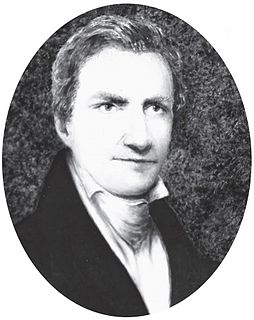
Matthew Lyon was an Irish-born American printer, farmer, soldier and politician, who served as a United States Representative from both Vermont and Kentucky.

Martin Chittenden was an American politician from Vermont. He served as a United States Representative from 1803 to 1813 and as the seventh Governor of Vermont from 1813 to 1815, during a crucial portion of the War of 1812.

Isaac Tichenor was an American lawyer and politician. He served as the third and fifth Governor of Vermont and United States Senator from Vermont.
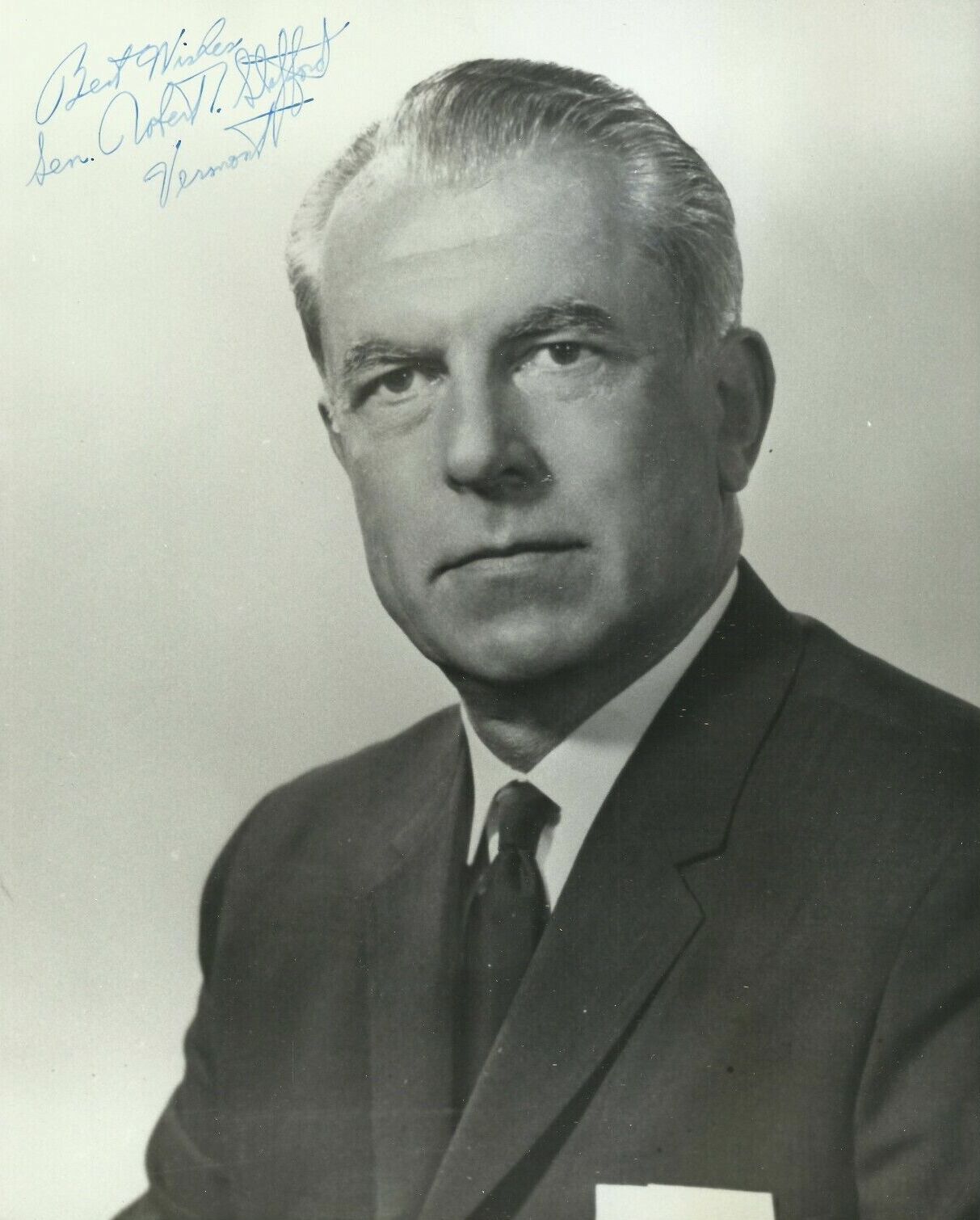
Robert Theodore Stafford was an American politician from Vermont. In his lengthy political career, he served as the 71st Governor of Vermont, a United States Representative, and a U.S. Senator. A Republican, Stafford was generally considered a liberal, or "Rockefeller" Republican.

Solomon Foot was a Vermont politician and attorney. He held numerous offices during his career, including Speaker of the Vermont House of Representatives, State's Attorney for Rutland County, member of the United States House of Representatives, and United States Senator.

Israel Smith was an American lawyer and politician. He held a wide variety of positions in the state of Vermont, including as a member of the United States House of Representatives, a member of the United States Senate and Governor of Vermont.
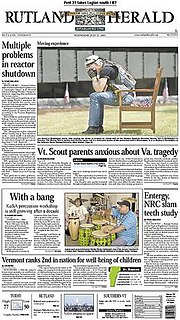
The Rutland Herald is the second largest daily newspaper in the U.S. state of Vermont. It is published in Rutland. With a daily circulation of about 12,000, it is the main source of news geared towards the southern part of the state, along with the Brattleboro Reformer and the Bennington Banner. The Rutland Herald is the sister paper of the Barre Montpelier Times Argus. Its seven eras of ownership, much simplified, are sketched below

Peter Thacher Washburn was a Vermont lawyer, politician and soldier. A veteran of the American Civil War, he was elected Governor of Vermont as a Republican in 1869, and was the first Vermont Governor to die in office.
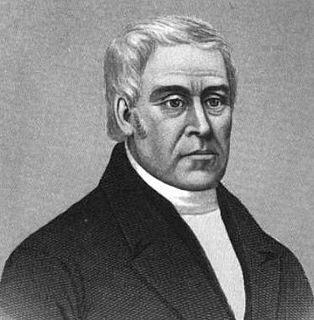
James Witherell was an American politician. He served as a United States Representative from Vermont and as a Judge of the Supreme Court for the Territory of Michigan.

Chittenden Lyon was a United States Representative from Kentucky and the son of Matthew Lyon. He was born in Fair Haven, Vermont and attended the common schools. In 1801, he moved to Kentucky with his parents, who settled in Caldwell County, Kentucky. He engaged in mercantile pursuits in Eddyville, Kentucky and had large agricultural interests.

Nathan Fellows Dixon was an attorney and bank president from Westerly, Rhode Island. The son of Nathan F. Dixon and father of Nathan F. Dixon III, he was best known for his service as a United States Representative from Rhode Island from 1849 to 1851, and again from 1863 to 1871.
Thomas James Duncan Fuller was a United States Representative from Maine.

Anthony Haswell was an English immigrant to New England, where he became a newspaper, almanac, and book publisher, the Postmaster General of Vermont and one of the Jeffersonian printers imprisoned under the Sedition Act of 1798.
Abel Spencer was a Vermont lawyer and politician who served as Speaker of the Vermont House of Representatives twice and was expelled from the House for theft.
Amos Marsh was a Vermont lawyer and politician who served as Speaker of the Vermont House of Representatives.
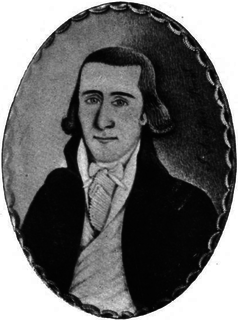
George Cadwell was an American pioneer, politician, and physician from Connecticut. After Cadwell studied medicine in Vermont, he married a daughter of Matthew Lyon. He left with Lyon to Kentucky, but then settled in the Indiana Territory after a dispute about slavery. He served in the government of Madison County, then was elected to the Illinois Senate when the state was founded in 1818. He served three two-year terms, then resumed the practice of medicine.
The Bradford Journal-Opinion is a weekly newspaper based in Bradford in the U.S. state of Vermont. It was formed in 1978 through the unification of the Journal of Woodsville, New Hampshire and the United Opinion of Bradford. The Bradford Journal-opinion is published weekly on Wednesdays and it covers the areas of Orange County, Vermont and Grafton County, New Hampshire. According to the American Newspapers Representative database, the Journal-Opinion has a weekly paid circulation of 4,700 and a free circulation of 500.
James McNeil is a businessman and politician from Vermont. A lifelong resident of Rutland County, he served in the Vermont House of Representatives from 2008 to 2013, and has been a member of the Vermont Senate since 2019.
References
- 1 2 3 Matthew Lyon, the Hampden of Congress, p. 206.
- ↑ Matthew Lyon, the Hampden of Congress, p. 156.
- ↑ Matthew Lyon, the Hampden of Congress, p. 195.
- ↑ Matthew Lyon, the Hampden of Congress, p. 7.
- ↑ Matthew Lyon, the Hampden of Congress, p. 204.
- ↑ "History of Vermont Newspapers".
- ↑ Matthew Lyon, the Hampden of Congress, p. 205.
- ↑ Matthew Lyon, the Hampden of Congress, p. 199.
- ↑ Matthew Lyon, the Hampden of Congress, p. 207.
- ↑ The Press in American Politics, 1787–2012.
- ↑ Matthew Lyon, the Hampden of Congress, p. 342.
- ↑ U.S. History, Grades 6 - 8: People and Events: 1607-1865.
- ↑ Matthew Lyon, the Hampden of Congress, p. 437.